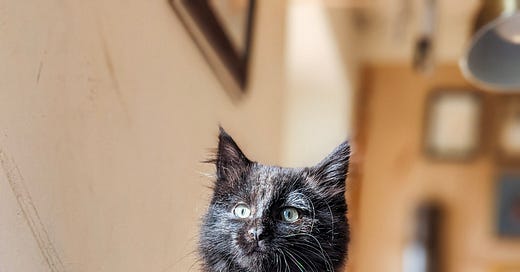Adaptability not certainty
We want a finalised package. We want certainty before we decide what to do. But life doesn’t work that way. What we need to strengthen is our adaptability, not our certainty.
As I write this, our new kitten Storm is snoozing away on my lap. We got her three weeks ago at arguably not the best time. Our lives are so busy at the moment and we’re trying to sell our house. In fact, I said yes to having her in an incredibly hectic week. We were starting the new term and the project I run for home educated young people was putting on a county-wide film festival. When I pause enough, I can see the pattern, that just when I’m feeling overloaded with how much there is to do, I take on yet another thing.
But all in all, welcoming Storm into our family has been a good decision. While there are lots of reasons to slow down and resist being too busy, I value the part of myself that doesn’t let overthinking get in the way of welcoming in more joy, more love, more fun. This is the part of me that chose to home educate, to start a farm, to start a learning community. Sometimes the risks have been realised - there’s a lot of sting I’m currently healing from - but in so many ways my life is richer for not getting bogged down in the what ifs.
One is that I’ve developed a deep trust in myself and in others to figure things out. I am much more willing to say, “Let’s get started and we will work it out as we go along,” than I ever was before. I am choosing to experience my life iteratively rather than putting pressure on potential experiences to already by the finished product. What I mean by that is that I feel more willing to try things and try again, rather than feeling they must be perfect and complete the first time around. I expect there to be mistakes, challenges, conflicts and just plain old change, and I know that I can work with all of that.
Just before the start of the term I went to the Freedom to Learn UK Forum. As often happens at these things, the conversations between the sessions and the sessions themselves stitched together a tapestry that laid out before me what my heart and mind had been working on.
One of these was a talk by Tim Rutherford, a director and mentor at Bristol Learning Community (BLC). He spoke about the many iterations they’d been through as a self-directed project-based programme, supporting tweens and teens to figure out what they would like to work on. I run a similar programme with Soulcraft Learning Community (though we seem to have evolved to put more emphasis on collaborative group projects than individual) so I was intrigued to know more about what they’d tried. Yet each time Tim explained what they’d done that seemed to work, he gleefully said that they eventually scrapped it because it stopped working.
I was struck by how often, societally, we’re reaching for the formula, the proven and tested one-size-fits-all solution that can be replicated. That’s what school offers. And in the main, that’s why it’s so widely touted as being the system that knows best for children rather than an experiment which is failing so many. I understand that school is the option many families need to take (there need to be more options!). I take issue with how the normalisation of compulsory schooling has eroded parents’ ability to trust themselves and their children with making good decisions together.
I think of some of the frequent “whatabouts” that I get asked when it comes to home education, things like screens, exams and learning to read. So much of our fear around these issues and others comes from not believing that we can figure it out as we go along.
We want a finalised package. We want certainty before we decide what to do. But life doesn’t work that way. People are always changing, our circumstances are changing, the world around us is changing. What we need to strengthen is our adapability, not our certainty.
So the lesson I took from Tim’s hands-on research at BLC was that it isn’t about curating a programme that could be neatly marketed to parents. The offer is flexibility, the willingness to keep on being co-created by the adults and young people in the space, changing to meet the changing needs of both the individuals and the group.
I mentioned these thoughts to my friend Artemis (founder of the same BLC) and they indentified that it’s the difference between the scientific process and dogma. Dogma lays out the way you must go and you must never diverge from it. The scientific process is always taking note and asking questions, reflecting on what’s happening and aiming to respond to that.
When I feel I have to promise and achieve certainty, I am riddled with anxiety and much more prone to overriding consent, both others’ and my own. So much potential is lost.
When I know things can and will change, I am much more willing to watch, listen and wait before I respond. What I then bring to the situation has so much more depth and creativity. I move through life with so much more ease and playfulness.
Do you see places where this is true for you too? I’d love to chat more about this.
Love,
Adele x




